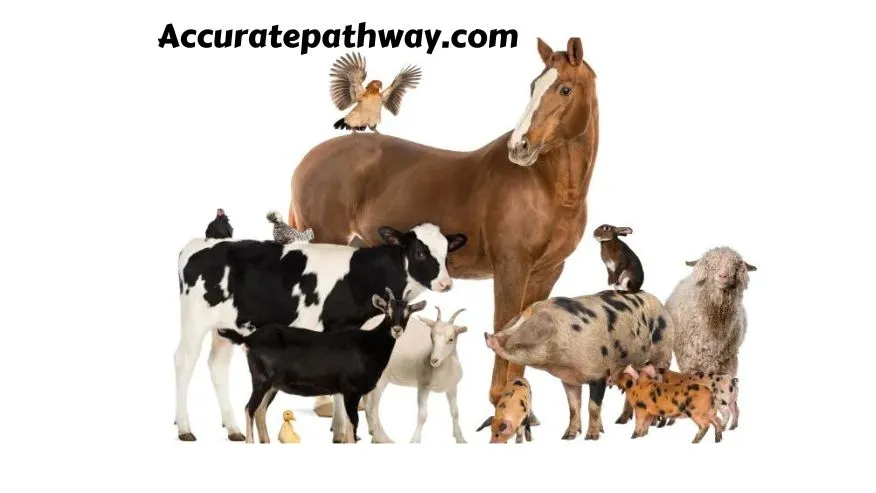Defining Pets and Domestic Animals
Pets are animals kept primarily for companionship, pleasure, or emotional support. They are typically valued for their loyalty, affection, and the joy they bring to their owners’ lives. Common pets include dogs, cats, birds, and smaller animals like hamsters and fish. The relationship between a pet and its owner is often emotional and mutually beneficial.
On the other hand, domestic animals encompass a broader category that includes any animals that have been selectively bred over generations to live alongside humans and serve specific purposes. Domestic animals can be pets, but they can also serve utilitarian roles such as providing food, labor, or other resources. Examples of domestic animals include cattle, horses, chickens, and sheep.
Purpose and Relationship Pets and Domestic Animals
One of the key distinctions between pets and domestic animals lies in their purpose and the nature of the relationship with humans:
Pets: Pets are primarily kept for companionship and emotional support. They often live inside the home with their owners, forming strong emotional bonds. The care and attention given to pets are typically focused on their well-being and happiness rather than any specific utility they provide.
Domestic Animals: Domestic animals, while they can also be companions, are often kept for practical reasons. For instance, cattle are raised for meat and dairy products, horses for riding or working, and chickens for eggs and meat. The relationship with domestic animals may be more transactional, where humans provide care in exchange for the resources or services these animals provide.
Care and Maintenance Pets and Domestic Animals
The care and maintenance of pets versus domestic animals also differ:
Pets: Owners of pets typically invest significant time, effort, and resources into their care, including food, veterinary care, grooming, and exercise. The well-being of pets is a priority, and owners often go to great lengths to ensure their comfort and happiness.
Domestic Animals: The care of domestic animals is often tied to their intended use. For example, dairy cows require specific nutrition and veterinary care to ensure milk production, while working animals like horses need training and proper housing to perform their tasks effectively. The care of domestic animals is more directly linked to their productivity or function.
Legal and Cultural Perspectives
From a legal and cultural standpoint, pets and domestic animals may also be viewed differently:
Pets: In many places, pets are considered members of the family, and laws may protect them from cruelty or neglect. There are often regulations regarding pet ownership, licensing, and responsibilities of pet owners towards their animals’ welfare.
Domestic Animals: Regulations regarding domestic animals often focus on their economic or agricultural significance. Laws may govern aspects such as livestock management, animal welfare standards in farming practices, and regulations related to transportation and trade of domestic animals.
The Advantages of Having Pets in Your Life
Pets have a unique ability to enrich our lives in numerous ways, beyond just being adorable companions. Whether you prefer dogs, cats, birds, or smaller animals like rabbits or fish, each pet brings its own set of advantages that contribute positively to our physical, emotional, and social well-being. Here are some of the key advantages of having pets:
1. Companionship and Emotional Support:
Pets provide unconditional love and companionship. They are always there for us, offering comfort during difficult times and companionship during moments of solitude. The bond between a pet and its owner can be deeply fulfilling, reducing feelings of loneliness and isolation.
2. Stress Relief and Mood Improvement:
Interacting with pets has been shown to reduce stress levels and promote relaxation. The act of petting a dog or cat, for example, can lower cortisol levels (a stress hormone) and release oxytocin (a feel-good hormone), contributing to a calmer and more relaxed state of mind.
3. Physical Health Benefits:
Having pets can lead to improved physical health in several ways. Dog owners, for instance, tend to get more exercise through daily walks or playtime, which can contribute to better cardiovascular health and lower blood pressure. Additionally, studies have shown that owning pets may help boost immune function and reduce the risk of allergies and asthma in children raised with pets.
4. Social Interaction and Community Building:
Pets can serve as social catalysts, helping their owners connect with others. Whether it’s chatting with fellow dog owners at the park or bonding with colleagues over shared pet stories, pets can facilitate social interactions and strengthen community ties.

5. Teaching Responsibility and Routine:
Caring for a pet requires commitment and responsibility, which can be highly beneficial, especially for children. Pets teach valuable life skills such as empathy, patience, and consistency. Taking care of a pet also establishes a daily routine, which can provide structure and stability in our lives.
6. Psychological Benefits:
Pets can have profound psychological benefits, including reducing symptoms of anxiety, depression, and even PTSD. Therapy animals, for example, are used in therapeutic settings to provide emotional support and comfort to individuals facing mental health challenges.
7. Sense of Purpose and Fulfillment:
Many pet owners derive a sense of purpose and fulfillment from taking care of their pets. The act of nurturing another living being and being responsible for their well-being can give us a sense of meaning and satisfaction.
8. Entertainment and Fun:
Pets bring joy and laughter into our lives with their playful antics and unique personalities. Whether it’s watching a cat chase a toy or enjoying the playful energy of a puppy, pets have a way of brightening our days and keeping us entertained.
Advantages of Domestic Animals in Human Society
Domestic animals have been integral to human civilization for thousands of years, serving various purposes that have contributed significantly to our well-being, economy, and culture. From providing food and labor to offering companionship and even therapeutic benefits, domestic animals play diverse and crucial roles in our lives. Here are some of the key advantages of domestic animals:
1. Food Production: One of the primary advantages of domestic animals is their role in food production. Animals such as cattle, chickens, pigs, and goats are raised for meat, eggs, milk, and other dairy products. These products form essential components of our diet, providing protein, vitamins, and minerals necessary for human health.
2. Agriculture and Farming: Domestic animals play a vital role in agriculture and farming practices. They are used for plowing fields, pulling carts, and transporting goods in rural and traditional farming communities. Horses, oxen, and donkeys, for example, have been historically crucial in cultivating crops and aiding in agricultural activities.
3. Economic Contribution: Livestock and other domestic animals contribute significantly to the global economy. They support industries such as meat production, dairy farming, wool and leather production, and pet breeding. The economic value of domestic animals extends beyond direct product sales to include employment opportunities and income generation for millions of people worldwide.
4. Utilization of Resources: Domestic animals efficiently convert resources that are not suitable for direct human consumption into valuable products. For example, cattle can graze on grasslands and convert cellulose-rich plant material into meat and milk. This ability helps optimize resource utilization and supports sustainable agricultural practices.
5. Cultural Significance: Domestic animals have profound cultural significance in many societies around the world. They are often integral to cultural practices, rituals, and ceremonies. For example, cattle are revered in some cultures as symbols of wealth and prosperity, while animals like dogs and cats have been companions and symbols of loyalty and companionship throughout history.
6. Companionship and Emotional Support: While not traditionally considered domestic animals in the agricultural sense, pets such as dogs, cats, birds, and rabbits provide companionship and emotional support to millions of people worldwide. The bond between humans and their pets enhances well-being, reduces stress, and promotes mental health.
7. Environmental Benefits: Properly managed grazing by domestic animals can contribute to sustainable land management and ecosystem health. Grazing animals can help maintain grasslands and prevent the encroachment of woody plants, thus preserving biodiversity and supporting habitats for various wildlife species.
8. Conservation and Breed Diversity: Many domestic animal breeds are the result of centuries of selective breeding for specific traits and purposes. Preserving and maintaining diverse breeds of domestic animals contributes to genetic diversity, which is crucial for adaptation to changing environmental conditions and ensuring the resilience of agricultural systems.
Conclusion
In summary, while all pets are domestic animals, not all domestic animals are considered pets. Pets are cherished companions valued for their emotional support and companionship, whereas domestic animals encompass a broader spectrum of animals that serve various utilitarian roles in human society. Understanding these distinctions helps us appreciate the diverse relationships between humans and animals and the multifaceted roles they play in our lives. Whether as beloved pets or working animals, their presence enriches and enhances our existence in countless ways.
